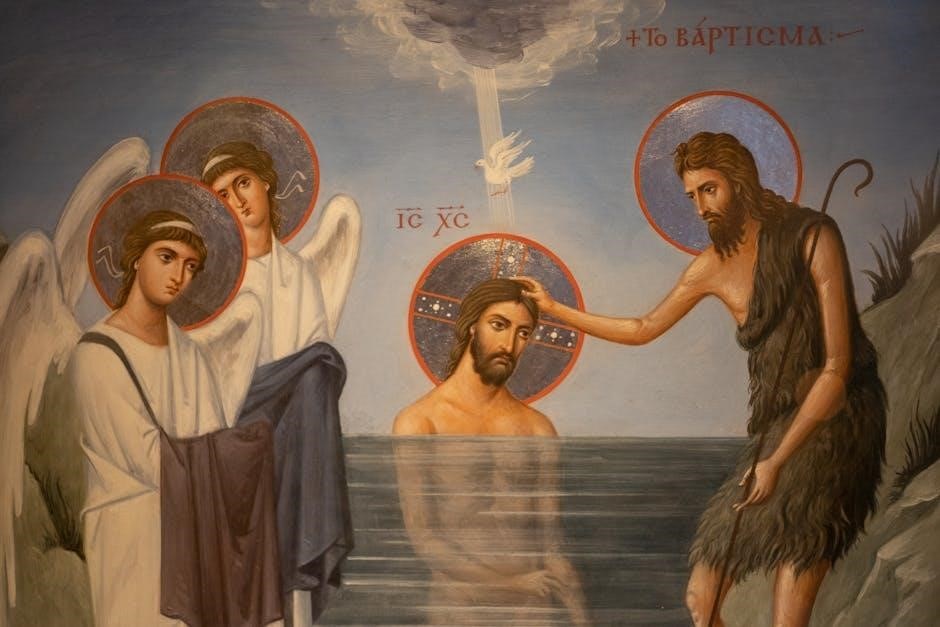7 covenants of the bible pdf
The Bible outlines seven significant covenants‚ forming the backbone of God’s relationship with humanity. These include the Adamic‚ Noahic‚ Abrahamic‚ Mosaic‚ Davidic‚ New‚ and Everlasting Covenants‚ each revealing God’s divine plan and promises.

The Adamic Covenant
The Adamic Covenant‚ established in Genesis‚ is the first covenant between God and humanity‚ involving Adam and Eve. It includes the command to multiply and fill the earth‚ with dominion over creation. God also forbade eating from the Tree of Knowledge of Good and Evil‚ warning of death for disobedience. Adam’s disobedience led to sin entering the world and the ground being cursed. Yet‚ Genesis 3:15 introduces the promise of redemption through the seed of the woman‚ symbolizing the Messiah. This covenant sets the stage for humanity’s need for redemption and divine restoration‚ foundational for understanding subsequent covenants and God’s overarching plan of salvation through Jesus Christ.
The Noahic Covenant
The Noahic Covenant‚ found in Genesis 6-9‚ is a divine promise between God and Noah‚ representing a universal agreement with all humanity and every living creature. Established after the Great Flood‚ it signifies God’s commitment to never again destroy the earth with a flood. The rainbow serves as a perpetual sign of this covenant‚ symbolizing divine mercy and faithfulness. This covenant emphasizes God’s grace and the preservation of life‚ ensuring the continuity of the natural order. It also includes commands for humanity to respect life and maintain justice. The Noahic Covenant underscores God’s enduring faithfulness and sets a foundation for future covenants‚ highlighting His plan to sustain and redeem creation through His promises. This covenant remains a cornerstone of biblical theology‚ illustrating God’s love and mercy toward all humanity.
The Abrahamic Covenant
The Abrahamic Covenant is a pivotal and eternal promise established by God with Abraham‚ as recorded in Genesis 12‚ 15‚ and 17. This unconditional covenant is rooted in God’s sovereign grace‚ promising to make Abraham the father of a great nation‚ granting his descendants the land of Canaan‚ and blessing all nations through him. The covenant is sealed with the rite of circumcision‚ marking Abraham’s descendants as God’s chosen people. Central to this covenant is the promise of a Messiah who would bring redemption to humanity. Abraham’s faith in God’s promises is highlighted as a model of trust and obedience. While the covenant is eternal‚ its fulfillment extends beyond the physical descendants of Abraham to include all who share his faith in God. This covenant serves as the foundation for God’s relationship with Israel and ultimately with the Church‚ making it a cornerstone of biblical theology and redemptive history.
The Mosaic Covenant
The Mosaic Covenant was established by God with the Israelites at Mount Sinai‚ following their deliverance from Egyptian bondage‚ as detailed in Exodus 19-24 and Deuteronomy 29. This covenant‚ unlike the Abrahamic‚ was conditional‚ requiring Israel to obey the Ten Commandments and other laws given through Moses. The covenant’s central purpose was to create a holy nation‚ set apart to serve and glorify God. It included the establishment of the priesthood‚ sacrificial system‚ and the tabernacle‚ which served as symbols of God’s presence among His people. The Mosaic Covenant functioned as a legal framework‚ outlining blessings for obedience and curses for disobedience. While it was a necessary step in God’s redemptive plan‚ it was not a means of salvation but rather a tutor leading to Christ. This covenant emphasized God’s holiness and humanity’s need for atonement‚ setting the stage for the New Covenant in Jesus Christ‚ which would fulfill and supersede it.
The Davidic Covenant
The Davidic Covenant‚ established in 2 Samuel 7‚ is a significant covenant where God promises to establish David’s house‚ throne‚ and kingdom forever. This covenant is unilateral‚ meaning it is based solely on God’s grace and not conditioned on David’s obedience. God assures David that his dynasty will never end and that his throne will be established perpetually. This covenant is deeply rooted in God’s plan of redemption and points forward to the Messiah‚ Jesus Christ‚ who would descend from David’s lineage. The Davidic Covenant emphasizes God’s faithfulness and sovereignty in fulfilling His promises‚ even beyond the lifetimes of those involved. It serves as a cornerstone in understanding Israel’s monarchy and the ultimate fulfillment of God’s kingdom through Jesus Christ. This covenant underscores the eternal nature of God’s promises and His unwavering commitment to His people. Its fulfillment is seen in the reign of Christ‚ the ultimate King of kings.

The New Covenant
The New Covenant‚ foretold in Jeremiah 31:31-34 and established through Jesus Christ‚ marks a significant shift in God’s relationship with humanity. Unlike the Mosaic Covenant‚ which was based on external obedience to the law‚ the New Covenant is characterized by an internal transformation. God promises to write His laws on the hearts of His people‚ leading to a genuine and intimate relationship with Him. This covenant is sealed through the blood of Christ‚ offering complete forgiveness of sins and a new way of relating to God. It emphasizes grace‚ faith‚ and the indwelling of the Holy Spirit‚ enabling believers to live according to God’s will. The New Covenant is universal‚ extending beyond Israel to include all people‚ and it serves as the foundation for the Christian faith. Its fulfillment is seen in the life‚ death‚ and resurrection of Jesus‚ who inaugurated this covenant as the ultimate High Priest and Mediator between God and humanity. This covenant underscores God’s love‚ mercy‚ and desire for a deep‚ personal connection with His people.
The Everlasting Covenant
The Everlasting Covenant‚ rooted in biblical theology‚ is a divine agreement that transcends time and circumstance. It is first hinted at in Genesis and fully realized in the New Testament through Jesus Christ. This covenant is eternal‚ unchanging‚ and universal‚ encompassing all of God’s redemptive plans for humanity. It is built on the foundation of earlier covenants‚ such as the Abrahamic and Davidic‚ but extends beyond them to include all people. Central to the Everlasting Covenant is the promise of spiritual life‚ forgiveness‚ and an eternal relationship with God. It is sealed through the sacrifice of Christ‚ who became the mediator of this covenant‚ offering humanity a way to be reconciled to God. The Everlasting Covenant emphasizes God’s faithfulness and love‚ ensuring that His promises endure forever. It is the ultimate expression of God’s plan to dwell among His people and bring all things under His reign. This covenant serves as the culmination of biblical history‚ pointing to the eternal kingdom of God.
Significance of the Covenants in Biblical Narrative
The covenants serve as the framework of God’s redemptive plan‚ revealing His relationship with humanity and His promises throughout history. They unify the biblical narrative‚ showcasing God’s faithfulness and eternal purposes.
Biblical Narrative and Covenant Themes
The biblical narrative is deeply rooted in the concept of covenants‚ which serve as the framework for understanding God’s relationship with humanity. These covenants reveal themes of faithfulness‚ redemption‚ and divine promise‚ showcasing God’s overarching plan. From the Adamic Covenant’s establishment of humanity’s role to the New Covenant’s fulfillment in Christ‚ each agreement builds upon the previous‚ creating a unified story of salvation. The covenants emphasize God’s initiative and grace‚ highlighting His commitment to His people despite their failures. Themes such as land‚ descendants‚ and blessing are central‚ particularly in the Abrahamic and Davidic Covenants‚ while the Mosaic Covenant introduces the Law as a means of fellowship with God. The Everlasting Covenant underscores the eternal nature of God’s promises‚ culminating in Christ’s reign. These covenant themes weave together‚ forming a cohesive narrative that reflects God’s love and sovereignty throughout history.
Key Themes and Promises Across the Covenants
Central themes include faithfulness‚ redemption‚ and divine promises‚ with each covenant building on the last‚ emphasizing God’s grace and commitment. Promises of land‚ descendants‚ and eternal blessings are consistent throughout.
Central Promises and Recurring Themes
The covenants emphasize God’s faithfulness and grace‚ with recurring themes like redemption‚ divine presence‚ and eternal blessings. Promises include land‚ descendants‚ and spiritual restoration‚ reflecting God’s plan for humanity’s salvation and relationship with Him.

Modern Application and Relevance
The covenants remain highly relevant today‚ offering spiritual guidance and hope. They emphasize trust in God’s promises‚ shaping modern faith and ethical living. By studying these covenants‚ believers can deepen their understanding of God’s timeless plan and apply His truths to contemporary life‚ fostering a stronger relationship with Him.

Resources for Further Study
For a deeper understanding of the 7 covenants‚ exploring biblical texts and scholarly resources is essential. Reading the Bible‚ particularly key passages like Genesis‚ Exodus‚ and Hebrews‚ provides foundational insights. Commentaries and study guides by theologians offer detailed analyses‚ while online resources such as PDFs and articles can enhance comprehension. Many churches and ministries provide study materials that focus on covenant theology. Additionally‚ books on covenant themes and their modern relevance are widely available. Engaging with these resources can enrich one’s spiritual journey and deepen their connection to God’s promises. Utilizing these tools encourages believers to apply covenant principles to their lives‚ fostering a stronger faith and a clearer understanding of God’s plan.
The seven covenants of the Bible—Adamic‚ Noahic‚ Abrahamic‚ Mosaic‚ Davidic‚ New‚ and Everlasting—reveal God’s unfolds plan of redemption and relationship with humanity‚ showcasing His faithfulness and love. Each covenant builds upon the previous‚ culminating in the New Covenant through Jesus Christ‚ who brings complete forgiveness‚ revelation‚ and a better relationship with God. These covenants are eternal‚ with the New Covenant being the ultimate expression of God’s grace. Understanding these covenants deepens one’s connection to God’s promises and His divine plan. By studying these covenants‚ believers can renew their minds to God’s truth‚ applying His principles to health‚ relationships‚ and prosperity. The covenants remind us of God’s sovereignty and the transformative power of His Word. Embracing these teachings fosters a stronger faith and a clearer understanding of God’s eternal plan for humanity.
